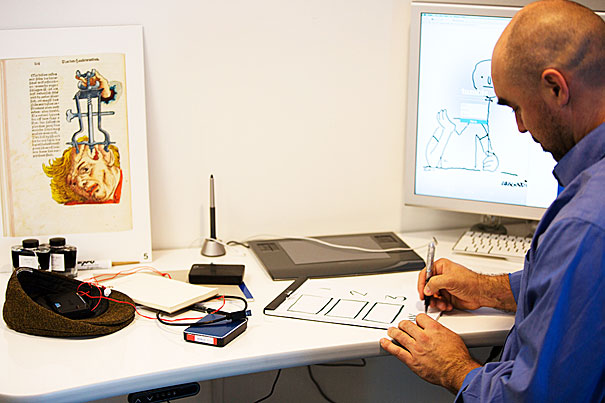
Behind each HarvardX learning experience, from a course to a module, is a team of content, technology, video, and instructional experts providing support for the lead faculty instructors.
Ana Trandafir/HarvardX
New horizons for HarvardX
Technological teaching initiative looks to reinvent MOOCs
HarvardX, the University-wide initiative supporting faculty experimentation in teaching and learning through technology, is slated to launch 14 new and returning online offerings through the winter and spring of 2014.
In addition to covering disciplines from economics to genomics to history, the lineup represents a continuing move by Harvard faculty to reinvent the MOOC, or massive open online course, and use the Web to enhance rather than directly replicate what happens in the classroom.
“We are expanding our approach to not focus exclusively on semester-based, linear courses but to now include entirely new and more flexible ways of teaching. Our faculty’s creativity demands it,” said Robert Lue, professor of the practice of molecular and cellular biology, faculty director of HarvardX, and Richard L. Menschel Faculty Director of the Derek Bok Center for Teaching and Learning.
Peter Bol, vice provost for advances in learning, agreed, adding, “Having different formats better supports experimentation and research. We want to test out and try lots of different technology platforms. EdX is terrific for many faculty, but some want to really break the mold and invent things from scratch.”
Bol’s SW12x, “ChinaX,” launched in mid-fall and co-taught with William Kirby, is a case in point. Divided into multiple discrete components, “ChinaX” spans, as a whole, 48 weeks. Embracing the online milieu further, the instructors even released a music video, now gone viral, to help students remember the names and dates of the Chinese dynasties.
Some of the newer offerings incorporate longstanding teaching approaches such as the case method, as with HBS2108x, “Innovating in Health Care,” or invent hands-on techniques suited for digital devices, as with HMS753x, “Musculoskeletal Anatomy,” which should open for registration in the spring. Still others are collaborations between disciplines, such as SW25x, “Global Health: Case Studies from a Biosocial Perspective,” taught by faculty in medicine as well as in the arts and sciences.
Recent multimodal experiments and the use of HarvardX materials in a wide variety of campus and online settings have also influenced the nature of instructional design and assessments. In the fall, for example, CB22x, “The Ancient Greek Hero,” was run concurrently on edX for free and through the Extension School for credit, while various components were used, such as a supplemental e-textbook for the College general education course.
With increased participation in HarvardX by the University’s professional Schools — Harvard Business School (HBS) and Harvard Medical School (HMS) will launch substantial offerings in the spring — HarvardX online learners, now numbering nearly 700,000, will be able to experience the diverse ways that faculty across the campus teach.
“I view ‘Innovating in Health Care’ not as a course but as an experience for entrepreneurial thinkers from business, health, public policy, and technology to come together and learn from us and each other,” said Regina E. Herzlinger, the Nancy R. McPherson Professor of Business Administration at HBS, who will teach HBS2108x, “Innovating in Health Care,” in the spring.
“I expect that, by the end, several start-ups will be created,” she said.
Herzlinger will be joined by Margo Seltzer, professor of computer science at the School of Engineering and Applied Sciences (SEAS), for a health information technology session, and by Kevin Schulman, the Gregory Mario and Jeremy Mario Professor of Duke University’s Fuqua School of Business, for a medical technology session.
HBS, in fact, will soon launch a complementary effort called HBX. Custom-built from the ground up, HBX is also developing a suite of online learning materials: a pre-MBA program focused on the fundamentals of business, an experimental virtual section to supplement existing courses, and a collection of resources on entrepreneurship.
“We are all excited about learning from HBX, which is taking a radically different approach to online learning with a very well-defined audience in mind,” said Lue.
In addition to the new offerings, returning popular courses such as CS50x, “Introduction to Computer Science”; ER22x, “Justice”; and HLS1x, “Copyright,” are giving HarvardX faculty pioneers an opportunity to refine their experiences, responding to prior student feedback and incorporating findings from research.
Beyond the campus, HarvardX is partnering with the Harvard Alumni Association to branch out with another experimental endeavor — HAA1x, “HarvardX for Alumni,” an exclusive online learning program for the University’s alumni slated to debut in the spring. Likewise, a simultaneous live and livecast event held at the Harvard Allston Education Portal in November based on AI12x, “Early American Poetry” showed the promise of community-based learning.
Also upcoming are the first HarvardX courses with optional revenue components, including verified certificates via edX and, in collaboration with the Division of Continuing Education, an enhanced version of CS50 that offers, for a fee, greater interaction with teaching assistants, virtual group office hours with the instructor, and, upon successful completion, a CS50 certificate and voucher toward a future for-credit course at the Harvard Extension School or the Summer School.
“Our faculty are leading the way in terms of creativity and experimentation, and I expect that these explorations will reveal ever more opportunities to use technology to enhance learning,” said Lue.
Here are the expected upcoming courses and modules from HarvardX.




